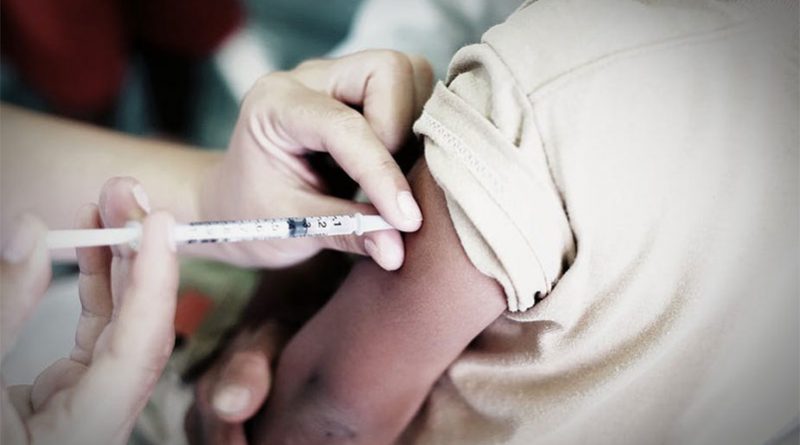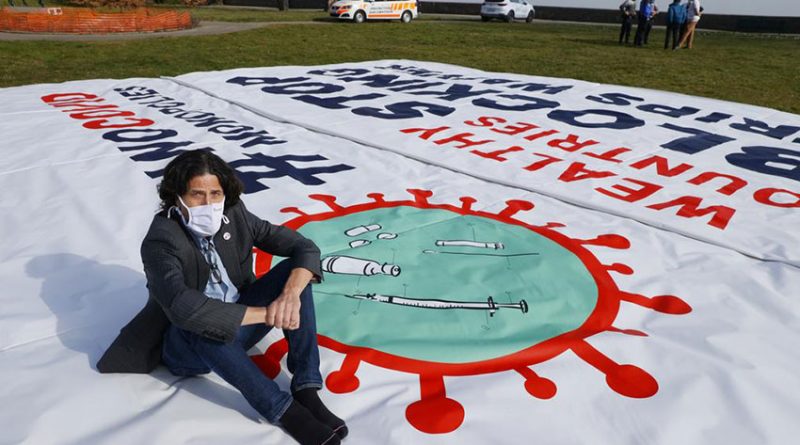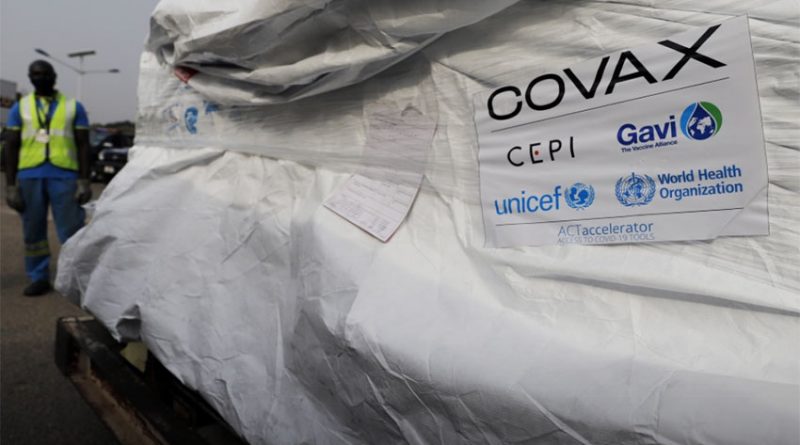MOST African countries will kick-start their COVID-19 vaccination programs by the end of March as efforts to procure doses for the continent’s 1.3 billion people gather pace, the World Health Organization (WHO) said yesterday.
The world’s poorest continent faces logistical and financial obstacles to securing all the vaccines it needs, but the WHO-led COVAX facility has begun to bear fruit.
“This week Africa has been at the forefront of COVAX facility deliveries, finally, with almost 10 million vaccine doses being delivered to 11 countries as of this morning,” WHO Africa’s Matshidiso Moeti told a virtual news conference.
“We expect that around half of African countries will receive COVAX deliveries in the coming week and that most countries will have vaccination programs underway by the end of March.”
COVAX, also led by the GAVI vaccines alliance and other partners, plans to send about 1.3 billion doses to 92 lower- and middle-income nations, covering up to 20% of their populations.
As of Thursday, Africa had reported at least 3,955,000 infections and 104,000 deaths. That is still a relatively small toll compared to other continents, with higher national death counts in the United States, India, Brazil, Russia and Britain.
DOCTORS Without Borders (MSF) staged a protest at the World Trade Organization on Thursday against what it said was the rich world’s reluctance to waive patents and allow more production of COVID-19 vaccines for poorer nations.
Activists seeking a waiver of intellectual property rules unfurled a huge sign reading “No COVID Monopolies – Wealthy Countries Stop Blocking TRIPS Waiver” in the park next to WTO’s headquarters on Lake Geneva.
They want the terms of the TRIPS agreement — the WTO’s Trade-Related Aspects of Intellectual Property — to be overridden to allow generic or other manufactures to make the new products.
WTO member states hold fresh talks next week on a proposal by India and South Africa to waive such rules for COVID-19 drugs and vaccines.
“If we had the waiver, we’d be able in a number of countries to scale up production right now, which would allow for the diagnostics, the medicines, and the vaccines to get where they’re needed most,” Stephen Cornish, general director of MSF Switzerland, told Reuters at the WTO.
“Right now we are seeing just a trickle of vaccines making it to the global South, and this is just not acceptable in today’s world,” he said.
Some 100 countries now support the campaign, Cornish added.
Tedros Adhanom Ghebreyesus, director-general of the World Health Organization (WHO), backed the move in a tweet on Thursday: “If a temporary waiver to patents cannot be issued now, during these unprecedented times, when will be the right time?”
“Big Pharma” has rejected the proposal that would grant compulsory licensing by overriding patent rules. Britain, Switzerland and the United States, which have strong domestic pharmaceutical industries, have opposed a waiver.
“Rich countries, the EU, the US, Canada and Switzerland … are blocking that derogation. And they are doing so in the name of profit and business and status quo instead of putting human lives above profit,” Cornish said.
Globally, 265 million doses of vaccines have been administered, with 80% in just 10 countries, WHO’s top emergency expert Mike Ryan said on social media on Wednesday night.
He welcomed the first roll-out of COVID-19 vaccines this week through the COVAX facility that aims to provide doses to lower income countries, starting in Ivory Coast.
Nearly 10 million doses have been delivered in more than 10 countries, he said, adding: “That’s a huge step forward in terms of at least beginning the journey towards better vaccine equity around the world.”
THE following is a roundup of some of the latest scientific studies on the novel coronavirus and efforts to find treatments and vaccines for COVID-19, the illness caused by the virus.
COVID-19 can be transmitted via lung transplant
The coronavirus can linger in the lungs even when swab tests of the back of the nose and throat are negative, doctors reported after unknowingly transplanting infected lungs into a patient who later died of COVID-19.
University of Michigan surgeons obtained the lungs from a deceased donor who had tested negative for the virus and had reportedly never been exposed to it.
Soon afterward, the transplant recipient and one of the surgeons developed COVID-19. The team collected a fluid sample from the patient’s new lungs and compared it to a sample taken from the lungs immediately after removal from the donor, as well as to swab samples from the infected surgeon.
Genetic analyses showed the patient and surgeon had both acquired virus from the donor’s lungs, the doctors reported in the American Journal of Transplantation.
The surgeon had worn only a surgical mask when preparing the lungs for transplant, rather than full personal protective equipment because both donor and recipient had tested negative.
Potential lung transplant donors should all have specimens collected from deep within the lungs to be tested for the coronavirus, the report’s co-author Dr. Daniel Kaul said. The virus is less likely to be transmitted by other donated organs, such as the liver or the kidneys, he said. (https://bit.ly/3kn4L5q)
For ICU patients, COVID-19 is deadlier than flu
Compared to patients critically ill with the flu, patients critically ill with COVID-19 have a far higher risk of dying in the intensive care unit (ICU), a new study found.
Researchers in Mexico studied 147 patients with COVID-19 admitted to their ICU between March and October, and 94 patients admitted the year before with influenza A-H1N1.
All were in respiratory failure. Patients with flu were generally sicker when they arrived in the ICU but were more likely to survive. Their mortality rate was 22% versus 39% for the COVID-19 patients.
After accounting for baseline health status and other risk factors, the COVID-19 patients had a nearly four times higher risk of death, the researchers reported on Thursday in a paper posted on medRxiv ahead of peer review.
Compared to influenza, COVID-19 causes more severe lung damage, the researchers said, with “fewer possibilities of recovery.” (https://bit.ly/3pT9kpv)
New variant on the rise in New York City
A new coronavirus variant that shares some similarities with worrisome variants discovered abroad is on the rise in New York City, studies show.
At Columbia University, researchers were analyzing virus samples from patients at their affiliated medical center to monitor for virus variants first identified in the UK, South Africa and Brazil.
When they looked for a particularly concerning mutation called E484K – against which current antibody therapies and vaccines are less effective – they found it in some samples. In many cases, it was not in one of the variants from abroad but a variant not seen elsewhere.
By mid-February, the new variant represented about 12% of their cases, the Columbia researchers reported on Wednesday. The variant was also described in a separate study by California Institute of Technology scientists, who analyzed virus samples collected in New York State since November.
They found the new variant accounted for just 5% of samples in late January but almost 28% by late February.
Both reports were posted on medRxiv ahead of peer review. On Thursday, New York City Health Commissioner Dave Chokshi said the variant’s real-world effect is unknown and there is so far no indication that it reduces vaccine effectiveness. (https://bit.ly/3sjCqjo; https://bit.ly/3kpcjod; https://reut.rs/2NKJsz1)
Gyms are high-risk venues for coronavirus transmission
Gyms are high-risk venues for COVID-19 transmission and people need to be wearing masks while there, researchers warned in two papers published on Wednesday in the U.S. Centers for Disease Control and Prevention’s Morbidity and Mortality Weekly Report.
One study described an August outbreak in a Chicago gym where 55 COVID-19 cases were identified among 81 attendees of indoor high-intensity exercise classes.
“Twenty-two (40%) persons with COVID-19 attended on or after the day symptoms began. Most attendees (76%) wore masks infrequently, including persons with (84%) and without COVID-19 (60%),” the authors reported.
The other study reported on three gyms in Hawaii where 21 COVID-19 cases in July were linked to two instructors who taught classes while infected.
The rate of infection among students exposed before the instructors showed symptoms was 95%, the authors said. Gym attendees should wear masks, including during high-intensity activities, even when they are 6 feet (1.83 m) or more apart, the Chicago researchers said.
Facilities should enforce physical distancing, improve ventilation, and encourage attendees to isolate after symptom onset, possible exposure to COVID-19, or a positive coronavirus test result.
“Exercising outdoors or virtually could further reduce SARS-CoV-2 transmission risk,” they said (https://bit.ly/3uyjC1D; https://bit.ly/3sq3ltG).
Open https://tmsnrt.rs/3c7R3Bl in an external browser for a Reuters graphic on vaccines in development
Source – Thomson Reuters Foundation
Vaccines save lives and have been instrumental in preventing a myriad of infections that would otherwise cause undue suffering and death in children.
In Kenya, the extended immunisation programme has played a key role in reducing deaths among infants from a myriad of childhood ailments.
Nevertheless, health experts note that access to vaccines alone is not enough.
Children need to be immunised at the right time, based on the agreed schedules for recommended vaccines, to enable them to reap maximum health benefits.
One of the key vaccines given to children is the Bacillus Calmette-Guerin (BCG), which offers protection against tuberculosis (TB).
But a new study published in The Lancet Infectious Diseases Journal indicates that when given at the right time, it could protect newborns against a variety of common conditions such as upper respiratory tract infections, chest complications like pneumonia or bronchitis, diarrhoea and potentially Covid-19.
The vast majority of upper respiratory infections such as the common cold are caused by viruses.
Their symptoms include a runny or stuffy nose, coughing, fever, fatigue, wheezing and headaches that could be detrimental to newborns due to their low immunity.
According to the researchers, the findings of the study provided evidence showing that the BCG jab causes innate changes in the immune system of vaccinated infants, which may suggest that it boosts their immune system to work better against any infection.
This has led the researchers to suggest that the vaccine could provide protection in the early stages of novel outbreaks, such as Covid-19 or Ebola, before specific vaccines targeting them have been developed.
Further studies are already underway to explore whether the BCG vaccine could play a role in the response to Covid-19, with large trials involving healthcare workers and the elderly.
Indeed, Dr Tedros Ghebreyesus, the director-general of the World Health Organisation, has co-authored an article expressing interest in the possible use of the BCG vaccine for protection against Covid-19.
“Since the findings show that BCG seems to offer wider protection against a range of infections, our study also raises hopes that it might be useful in protecting the general population against Covid-19 and future pandemics — though we will need to see the results of other, more specific studies to know for sure,” said Dr Sarah Prentice, the lead author of the study from the London School of Hygiene and Tropical Medicine.
According to the researchers, this new Lancet Study is the first of its kind to rigorously investigate the full range of illnesses that the BCG vaccine could protect infants against.
It suggests that vaccinating all babies on the day of birth with the BCG vaccine could reduce newborn ailments and death in areas with high infectious disease rates, potentially saving thousands of lives a year.
“Nearly a million babies die every year of common infections so we urgently need better ways to protect them. Our research suggests that ensuring that the BCG vaccine is given at birth could make a big difference in low-income countries, potentially saving many lives,” said Dr Prentice of the London School of Hygiene and Tropical Medicine.
Based on the recommended health guidelines, the vaccine is supposed to be given to babies in Kenya at birth.
But vaccine stock-outs in remote areas usually causes delays, forcing parents to bring their babies back to the hospital for immunisation at a later date, when the BCG vaccines are available. For improved birth outcomes, the Health ministry recommends that mothers deliver in medical facilities under skilled care.
In such instances, the BCG vaccines can be administered swiftly to the infant.
But for the babies born at home, under traditional birth attendants, access to the vaccine is a challenge. And parents have to be encouraged to take the child to the hospital as soon as possible for the vaccine.
These delays put the child at risk of suffering or succumbing to largely preventable infectious diseases.
“It’s very exciting to think that the BCG vaccination might help keep newborns safe against other dangerous infections, in addition to providing protection against TB,” noted Hazel Dockrell, a co-author of the study and professor of immunology at the London School of Hygiene and Tropical Medicine.
“Although BCG is recommended at birth in many countries, it is often delayed due to logistical difficulties.
“Ensuring that the vaccine is given on day one, in areas with high rates of infectious diseases, could have a major impact on infections and deaths in the newborn period.”
The new study was conducted by the London School of Hygiene and Tropical Medicine, in collaboration with the Medical Research Council and Uganda Virus Research Institute.
It involved 560 newborns that were monitored for a range of illnesses in Uganda.
After six weeks, the results of the study showed that infection rates from any disease were 25 per cent lower in the group that had received the BCG vaccine at birth, compared to the group that had not yet received the vaccination.
Particularly, vulnerable groups such as babies with a low birth weight seemed to be protected the most.
Importantly, the vaccine appeared to protect babies against mild, moderate and severe types of infections.
Besides, the protection offered by the BCG vaccine did not also seem to be against one specific type of infection, but for all types — such as common colds, chest infections and skin infections.
Though conducted in Uganda, the results of the study are similar to previous ones done in West Africa that have shown a reduction in infant deaths following BCG vaccination at birth.
Source - The East African




